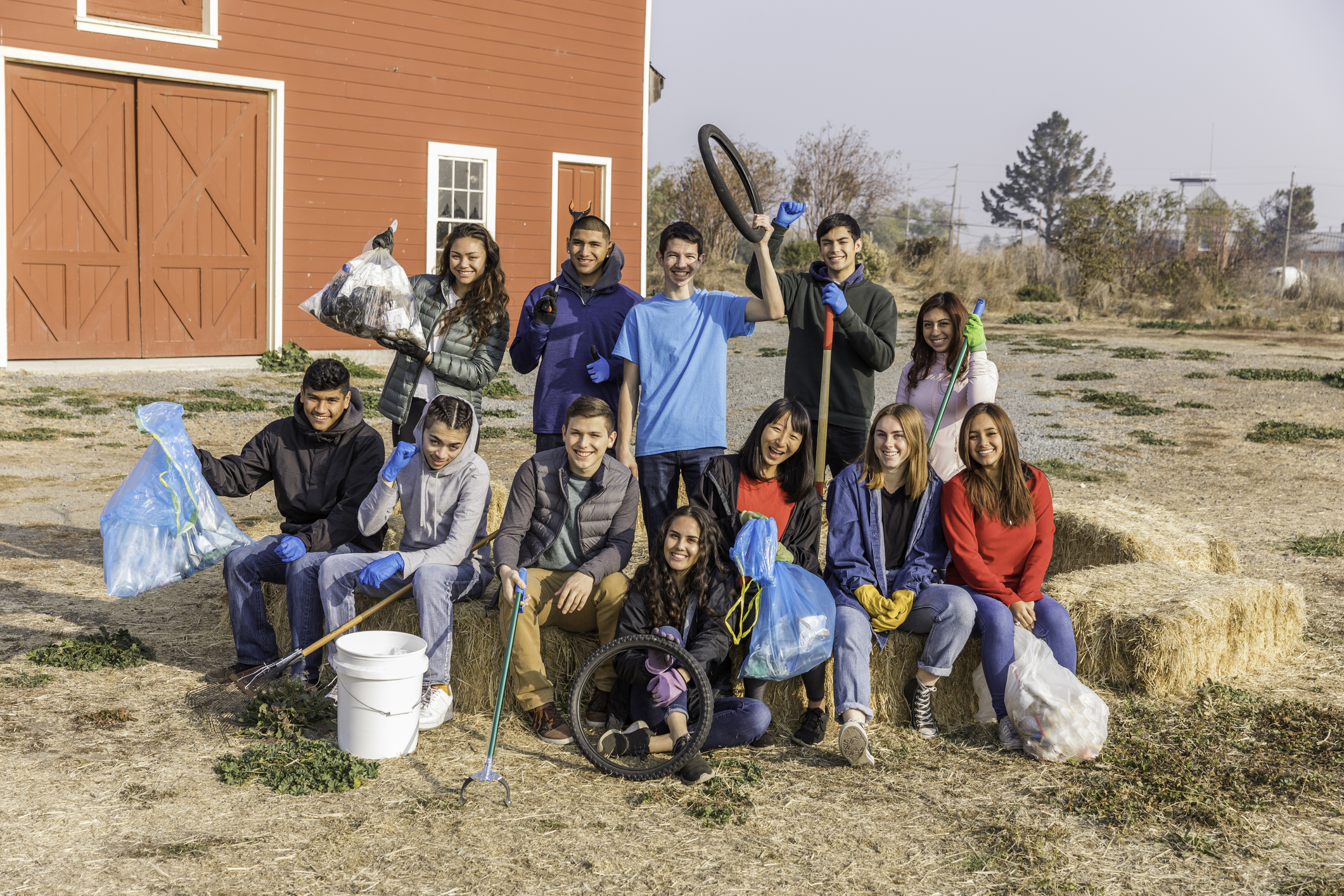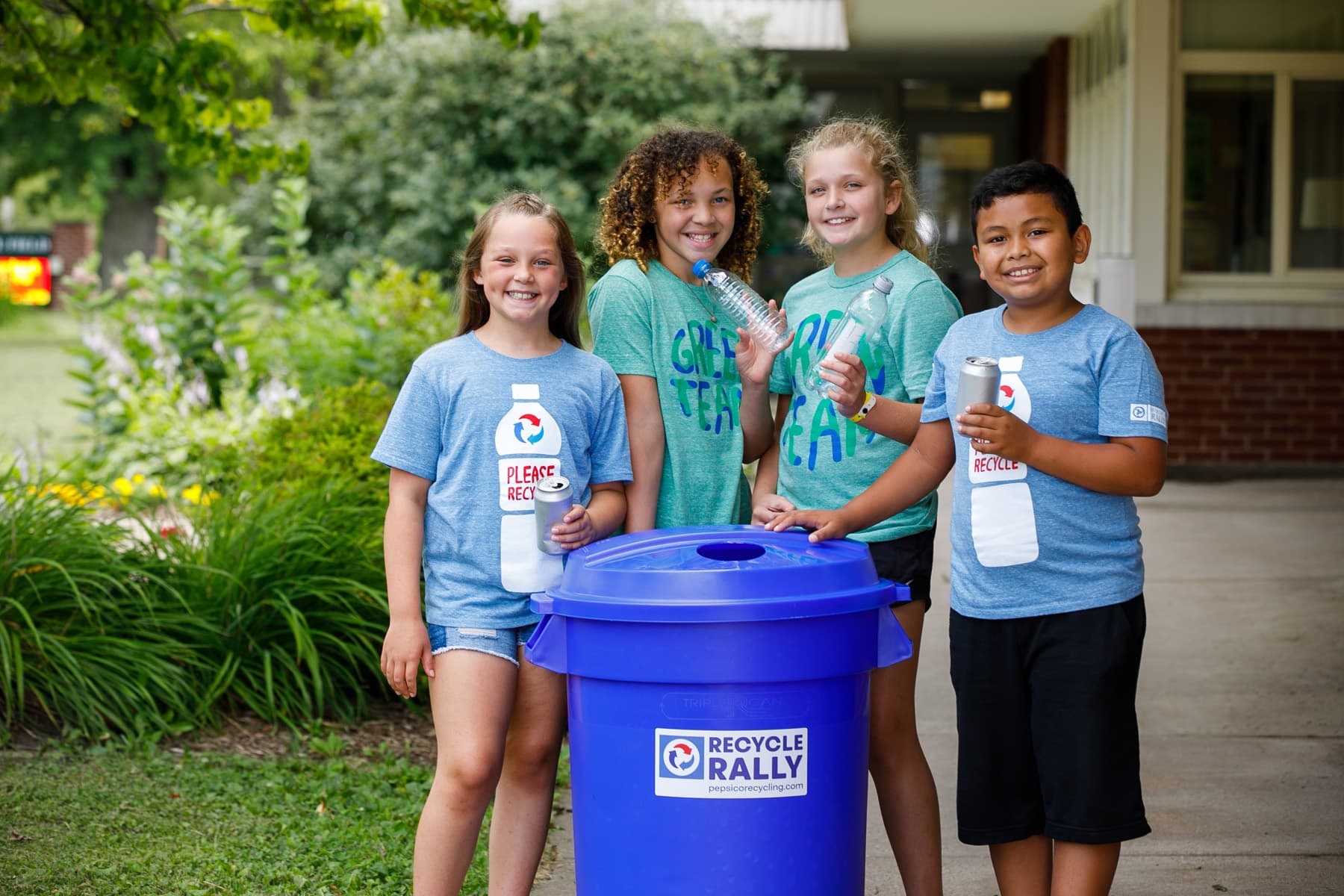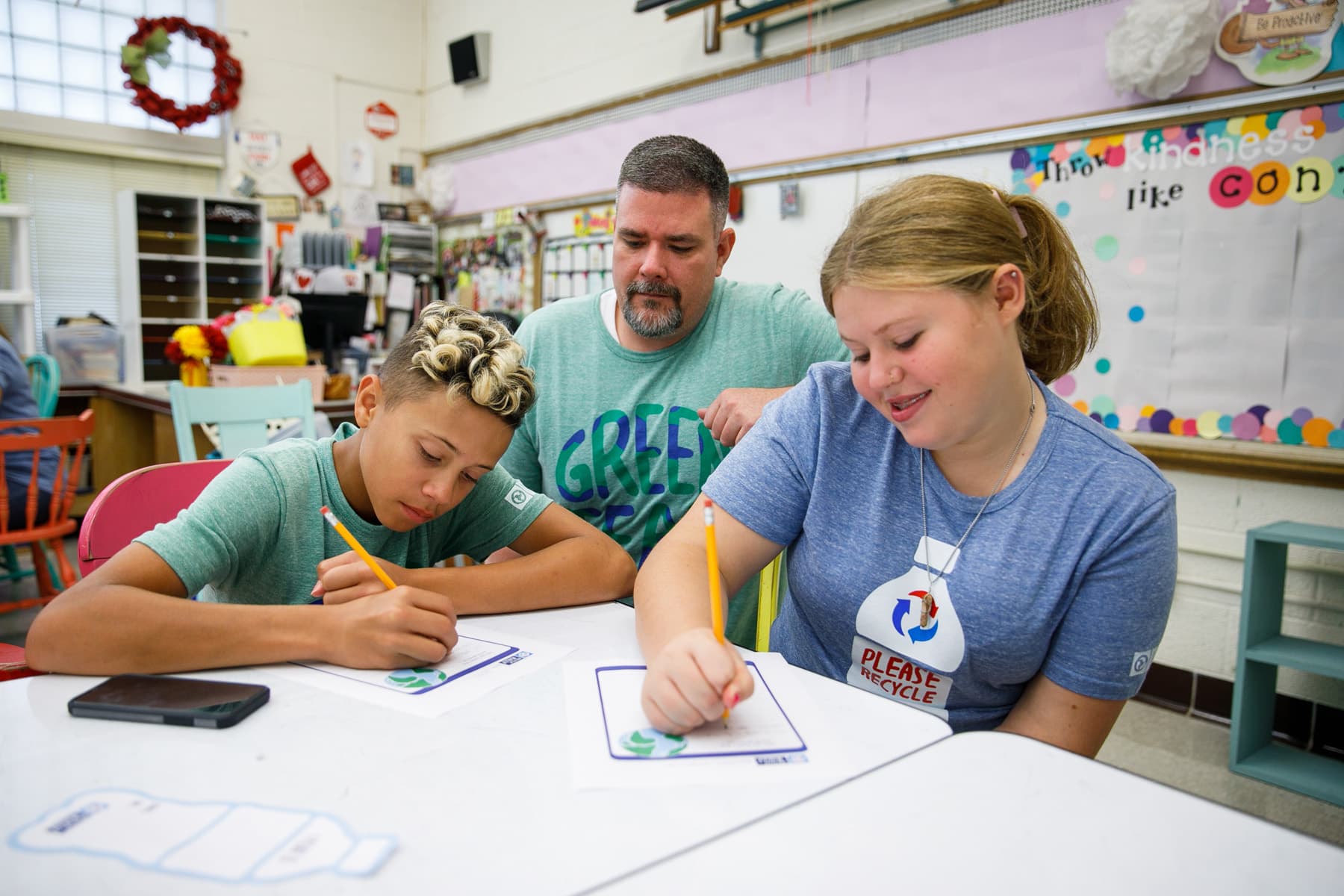What are the Personal Benefits of Participating in a Recycling Service-Learning Project?
We asked a teacher!

There’s a lot of talk about how much service learning can help students in school. We’ve heard how Recycle Rally schools use recycling to bring service learning to the classroom, so we were curious about how any kind of service learning affects students in their personal and academic lives. We reached out to Katy Farber, a teacher with substantial service learning experience, to ask her: “What are the personal benefits of service learning for our students?” Here’s what she had to say:
I knew we were onto something with service learning when one of my more disengaged sixth graders told me he’d never miss class on Tuesday. His mom had tried to schedule a dentist appointment on that day, but he’d told her, “I can’t miss Tuesday! That’s my time with my reading buddy!” I thought, “Whoa! He wants to come to school on days he is involved in our service learning and leadership project.” His attendance did improve, and so did his motivation and positive feelings about school. In his weekly role as a reading buddy to a first grader, he was happier and his confidence grew. These positive feelings began to spill over into his everyday attitude about school.
The academic benefits of service learning are real
The benefits of service learning have been well studied. Students who participate in service learning do better academically, have increased attendance, and are less likely to drop out of high school. And service learning, when done with high-quality components, increases student engagement (behavioral, cognitive, and affective).
And so are the personal benefits of service learning
My research and the work of others show promise not just for students’ academic growth but their personal growth as well. Students involved with high-quality service learning experiences can benefit in so many ways. Take a look at how some students took the lessons they learned from PepsiCo’s Recycle Rally into their communities to become Student Recycling Stars. We’ve seen kids learn how important attention to detail and working with other people is through their recycling service-learning projects. That’s why Recycle Rally created this step-by-step guide to creating a green service learning project.

Caring
Students develop their skills to care for people, land, organizations, and materials through direct experience. They work toward a common goal, be it to help a student, build a garden or chicken coop, or to clean up a river. They see a direct connection between what they are doing, collective purpose, and community care. One student, who struggled with showing care with other students, developed a capacity for picking up chickens and holding them gently. He practiced care with animals and this grew his capacity to care for and interact with humans.
Empathy
It is critical for our students to grow empathy for people who have different lived experiences. Some fascinating research about service learning proves that existing biases and stereotypes can be unlearned through these experiences. For example, fourth grade students in one study had biases against and stereotypes of elderly people. These were unlearned, and empathy was extended, based on a service learning experience. Couldn’t the world use more empathy?

Connections and Social Capital
Students who participate in service learning make strong connections to community partners, mentors, and community members. They feel more confidence and agency and develop key communication skills. This connection helps them grow their network of what is possible for them in their future in terms of purpose, career, and possibilities. You know the phrase “You can’t be it if you can’t see it.” For many students, service learning is the place where students grow narratives of possibility in working for positive change. For my students, some are now working in the fields where they had their service learning experience back in sixth grade!
Agency
Students participating in service learning have more choice and agency in what they are doing. This helps them use critical-thinking skills to solve problems and feel a sense of ownership of their education. Students learn that they are the captains of their own ships and that they can and should be in charge of their own learning and future (with educators’ support, of course!). Check out how PepsiCo’s Recycling program develops student agency by encouraging community outreach and public relations.

Inclusion
All students can thrive in service learning, especially those who have not found success in traditional learning environments. Social and problem-solving skills, collaboration, and physical hands-on skills all can be critical to the success of a project. For example, recycling service-learning projects get kids working together to educate the school around recycling policies and practices, develop problem solving skills when recycling is contaminated, and thrive. You can see their confidence grow when they build something useful and helpful.
Civic Engagement
Through service learning, students see how important community care and civic engagement are. They meet people who are working to make a positive impact on the world and are making progress. Additionally, they learn that their voice, leadership, and engagement matter and can make a difference. They don’t have to wait until they are 18—they can do something now. As a result, elders and community members see these students as vital members of the community who are helping to make positive change. For some excellent examples of how students can craft real world solutions to recycling and waste problems currently facing our planet, take a look at Sustainable Waste Curriculum: Rethinking Waste & Recycling for the 21st Century.

Collaboration
Working together with a variety of people from many different backgrounds is a crucial skill all individuals need to develop and practice for success in their professional and personal lives. Students involved in service learning develop key skills in collaboration that will serve them well in their current and future relationships, schools, and jobs. When students collaborate for a positive shared goal, they learn and develop listening, communication, and problem-solving skills that are certainly needed in a society facing multiple, intersecting problems.
Positive Culture
Teenagers are often seen for what society thinks they lack. Too much technology. Too many video games. But participating in service learning can help change this narrative in a community and school. First, it allows students see themselves as an important member of the community, and others do too. Then, through participation, they become embedded in circles of support, care, connection, and purpose. Finally, this can help shift the culture to be less focused on compliance and a top-down view of education. Together, students, community members, and teachers can build a culture where people work on equal footing.
Society often feels more polarized and fractured than ever before. Because of this, service learning may be more important than in the past. It has the potential to make communities stronger and to develop significant personal growth in the lives of students. Many students lost joy, connection, social experiences, and purpose during the COVID-19 pandemic. Service learning is a way to grow it back. It can be used to develop empathy, connection, purpose, and positive culture.
Not sure where to start? Katy Farber created a service learning tool kit here and also wrote a book on how to do it.
Dr. Katy Farber has over 20 years of public education experience. Farber is a professional development coordinator at the University of Vermont’s Tarrant Institute for Innovative Education. She has partnered with schools to help them personalize learning, engage students, and participate in action research. She earned her Doctorate in Education from Northeastern University in 2016 and is on the faculty of the Middle Grades Institute (planning and facilitating learning for practicing and pre-service teachers during a week-long professional development experience).
Learn More

Recycle Rally
Recycle Rally is a free K-12 program that provides rewards and tools to help enhance recycling at your school!
Explore now
Additional Resources
Our comprehensive library of resources was designed to inspire the next generation of green leaders.
Explore now

